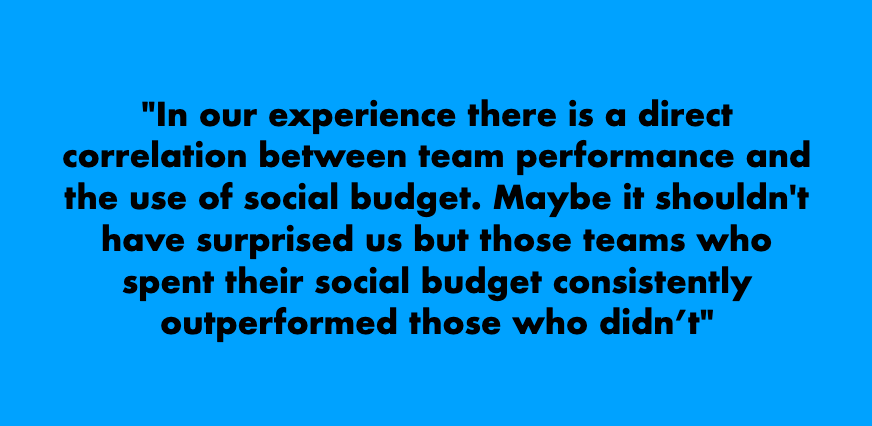Problems with workplace culture? Try the social cure
ALSO: brand new data from Slack, Deloitte on women's stress
Connection Connection Connection
I spoke a brilliant event run by the wellness platform Unmind last week. Before me was a panel of senior leaders from different businesses sharing details of the role of wellness in their businesses. One remark given by a senior leader of a well-known retail business dominated the conversation afterwards. Being asked about maintaining motivation in challenging times the exec told the packed room:
“In a business as big as ours while there are lots of success stories, but you will always find areas of the business that need improvement. In our experience there is a direct correlation between team performance and the use of their social budget. Maybe it shouldn't have surprised us but those teams who spent their social budget consistently outperformed those who didn't".
The teams who had planned team meals, team gatherings, team lunches beat those who hadn’t.
This resonated with me, I’ve had several adjacent discussion in the last week. One working parent told me that on a rare evening together with colleagues several of them had confided in each other that ‘things are just miserable at the moment aren’t they?’ Remote working was massively beneficial for life equilibrium but wretched for creating team cohesion.
It begs the question whether experiments couldn’t solve this?
Experiment: we work one or two co-ordinated days in the office. On those days we will be able to arrive later and leave earlier to accommodate care/childcare responsibilities.
Second experiment: we try making those anchor days meeting-free
Third experiment: we have team lunch one day a month
None of this is new to plenty of firms. I’ve heard it dozens of times, but I’m also surprised at how frequently companies are persisting with models that just aren’t working. Let’s look into a whole load of rich data which dropped this week, all of which supports a rethink.
Reminder: Flexible working is a diversity issue
Deloitte's Women @ Work 2022 survey makes for gruesome reading:
- 53% of women say their stress levels are higher than a year ago
- 46% say they're already at burn out
- 33% have taken time off due to mental health challenges
- burnout is number 1 reason to change jobs (alongside limited opportunity)
(The research also featured in a Guardian piece about burnout)
This is alongside evidence that members of the LGBTQ community and ethnic minority employees report that they experience fewer micro aggressions when working remotely. Be in no doubt flexible working is a D&I issue.
Further reading:
‘Community is something that is invented’
Over the course of the last few months I’ve revisited the work of Priya Parker several times. Parker wrote a bestseller called ‘The Art of Gathering’ which makes a point of emphasising that successful gatherings (meetings to you and me) need to be carefully curated. A good event doesn’t just have a venue and a time. It has an objective, a guest list, a format. It has clear intention. Parker spoke at a conference last week updating her thoughts for the post Covid world.
Highlight: at 14 mins she talks about breakthrough gatherings ‘give it a name’, ‘give it a rule’
Getting together the right way
The office is being wasted on impersonal video calls according to brand new UK workplace research released by Slack.
9 out of 10 workers are spending at least a day in the office...
... spending 2 hours on video calls to people who are at home (solution: co-ordination)
for a fifth of all UK knowledge workers they are spending half of their time in the office on video calls
Most UK workers are spending 3 days a week in the office.
65% of workers say they miss deskside conversations when working from home
This chat is seen as good for creativity and problem solving
Four out of five workers say chat gives them feel a sense of belonging
(Survey of 1000 UK knowledge workers, 23-29 Sept 2022). I think it’s worth saying that Slack’s Future Forum told me that they believed that the new rules of work demanded that ‘one person on a screen, all on a screen’. This would very clearly lead to more of this screen-based interaction that they’re declaiming.
On this topic Rob Mansfield (who curates a truly brilliant newsletter about life, work and culture) sent me this punchy Harvard Business Review article: 4 myths about in-person work dispelled. My favourite is Myth number 3: ‘people need a break from their screens’.
in particular: ‘...culture is what we experience all day, every day working at a particular company — it is decidedly not what we experience when we step away from the “normal” routine for various workshops and keynotes with nice buffet dinners and drinks.’
If you’ve read Fortitude please do drop me a review over on Amazon.




I mention her book in my tedxtalk - and I believe we are both speaking next week at the Inspirathan event? October 20th.